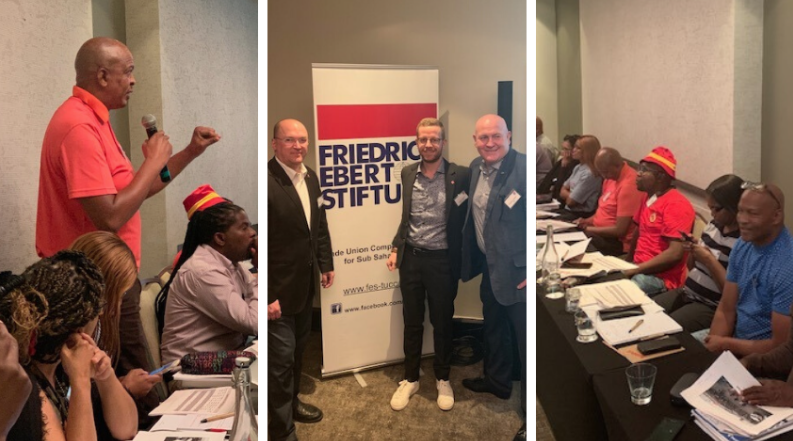Read this article in:
English
3 March, 2020Unions are determined to organize and fight precarious working conditions of low wages, contract and temporary work, and dangerous working conditions that are prevalent in the transport value chain.
It is estimated that 76 per cent of the transport workers are unorganized and the situation is worsened by a lack of investment in infrastructure. Violence against women is rife.
The dire situation in the transport sector was discussed at a high-level transport symposium 26-27 February, Johannesburg, which was organized by the International Transport Workers Federation (ITF) with support from the Friedrich Ebert Stiftung Trade Union Competence Centre for Sub Saharan Africa. The symposium was attended by 59 participants from nine unions, including IndustriALL Global Union affiliate, the National Union of Metalworkers of South Africa. ITF and IndustriALL agreed to work together to promote organizing across the value chains.
ITF general secretary, Stephen Cotton, said:
“The ITF is fully invested in the future of transport workers in South Africa.”
Speaking at the symposium, IndustriALL general secretary, Valter Sanches, said:
“There is continued precarization of work through Uber-like platforms which impact on employment and working conditions in the transport sector. Unions are better positioned to counter the trends of precarization through building unity and organizing workers inclusive of the high-end white-collar workers across all sectors.”
The symposium aimed at providing unions with a joint platform to build unity and establish a national coordinating committee, develop organizing strategies for non-unionized workers, build a national plan on strategic directions, agree on a road map, develop a dispute resolution mechanism, and identify potential allies, support organizations and available resources.
Further, the symposium agreed in a declaration that the participating trade unions need to build unity and cooperation in their diversity and recognize the right to co-exist in the sector. This can be done by respecting the independence and autonomy of the unions. Additionally, a coordinating strategy will be built to assist in growing trade union density in the sector from 22 to 90 per cent. Research will also be done to map the industry, build the capacity of shop stewards to enhance recruitment programmes, develop a coordinating committee that will include women and youth, and to develop programmes for collective action by the unions.
Presentations included the ITF survey on South African unions which aims to address issues facing the sector. The National Labour and Economic Development Institute presented its baseline survey on the transport sector.
There are similarities in the IndustriALL and ITF objectives on the decent work agenda, women empowerment, and youth programmes. The global unions are also campaigning for the ratification of Convention 190.
